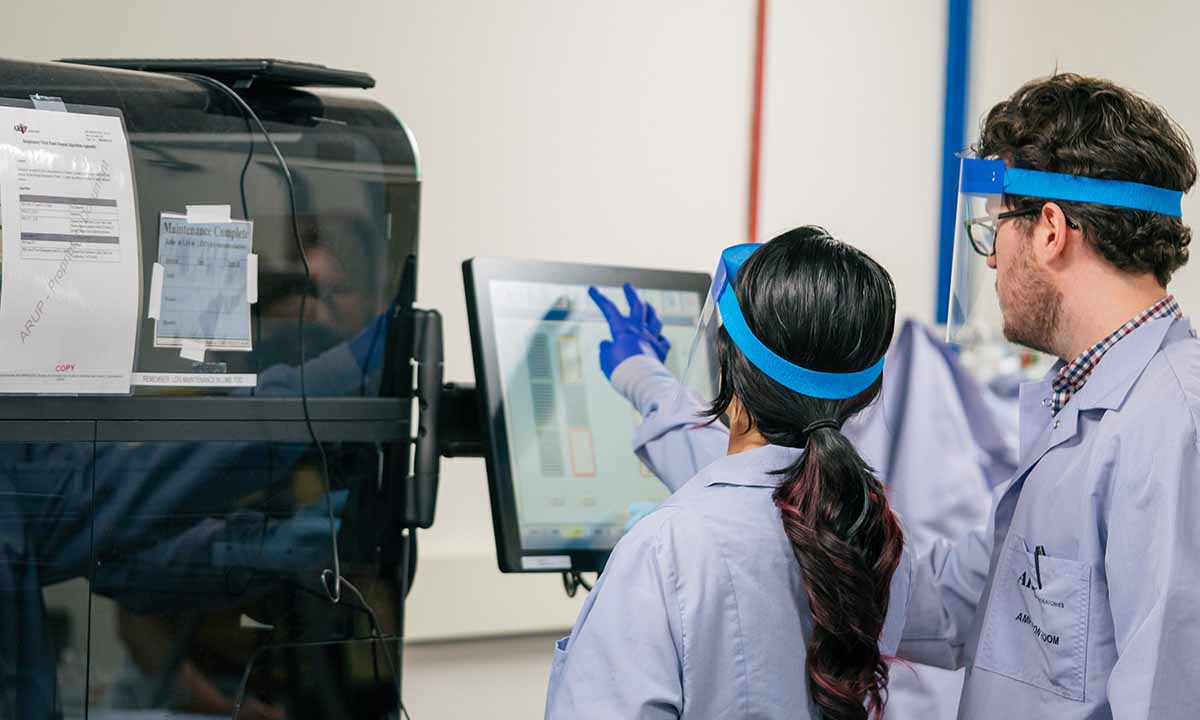
Medical laboratory professionals such as this pair at work at ARUP are in high demand. The U.S. Bureau of Labor Statistics estimated that nearly 26,000 more of these highly trained specialists will be needed each year through 2030.
SALT LAKE CITY—ARUP Laboratories and the University of Utah’s Division of Medical Laboratory Sciences have secured $3 million in federal funding through the Health Resources and Services Administration to build a new Advanced Practice Clinical Laboratory Training Center. The center will bolster educational opportunities for students in medical laboratory sciences in Utah and beyond and help address a critical need for highly trained laboratory professionals nationwide.
The $3 million in community project funding was included in the Labor, Health and Human Services, and Education Division of the Consolidated Appropriations Act approved by Congress and signed by President Biden on December 29, 2022. It will fund a first-of-its-kind collaboration between ARUP and the U, made possible by Rep. Chris Stewart’s help in securing the appropriation.
“The COVID-19 pandemic reminded us how important well-trained laboratory professionals are to providing accurate and timely test results that are critical to the delivery of the best patient care,” said Tracy George, MD, ARUP president and chief scientific officer. “Working together, we’ve come up with an innovative solution, and we’re so pleased that it can now move from concept to reality.
“ARUP is grateful to Congressman Stewart for advocating for this important project that will improve the health of so many Utahns,” George said.
Medical laboratory professionals were already in great demand before the COVID-19 pandemic highlighted the need for these highly qualified workers. In 2022, the U.S. Bureau of Labor Statistics projected that an additional 25,900 medical laboratory scientists will be needed each year through 2030, adding to a labor force that currently numbers more than 335,000.
The current shortage is due, in part, to an insufficient number of clinical training sites for students, which forces some academic programs to limit enrollment, said Diana Wilkins, MS, PhD, division chief of Medical Laboratory Sciences in the U's Department of Pathology. ARUP, University of Utah Health, and other community health systems already provide clinical training for many students, but the new center will expand capacity and increase exposure to state-of-the-art technologies that support patient care. Students in the U's program, which is accredited by the National Accrediting Agency for Clinical Laboratory Sciences (NAACLS), will be able to gain advanced laboratory experience at the center before finishing their clinical education in more specialized testing environments at ARUP and other locations.
“It will make a huge difference in the training of future laboratory professionals,” Wilkins said. “This collaborative effort is really a very creative way to increase the number of students we can graduate each year.”
She anticipates that the availability of the training center, which will be on the ARUP campus at University of Utah Research Park, will enable the U to reach its goal of doubling the number of annual graduates to 80.
George said the $3 million appropriation will fund the training center’s construction as well as state-of-the-art instrumentation that will enable students to gain valuable experience in specialized testing in clinical chemistry, hematology, coagulation, immunohematology, microbiology, virology, and immunology.
Beyond the federal funds, the Department of Pathology’s Medical Laboratory Sciences Division will provide funding for faculty and staff to develop and implement curricula and to provide instruction and assessment. The program has also secured a grant for a laboratory information system to be used in the training center.
The partners are already solidifying plans for the new center. The plan is for the training center to officially open in 2024, upon completion of construction.
Visit this page to learn more about the Medical Laboratory Sciences Division’s programs. Additional information about the profession is also available at ARUP’s MLS Faculty and Student Resource Center.
About ARUP Laboratories
Founded in 1984, ARUP Laboratories is a leading national reference laboratory and a nonprofit enterprise of the University of Utah and its Department of Pathology. ARUP offers more than 3,000 tests and test combinations, ranging from routine screening tests to esoteric molecular and genetic assays. ARUP serves clients across the United States, including many of the nation’s top university teaching hospitals and children’s hospitals, as well as multihospital groups, major commercial laboratories, group purchasing organizations, military and other government facilities, and major clinics. In addition, ARUP is a worldwide leader in innovative laboratory research and development, led by the efforts of the ARUP Institute for Clinical and Experimental Pathology®. ARUP is ISO 15189 CAP accredited.
About University of Utah Health
University of Utah Health is the state’s only academic healthcare system, providing leading-edge and compassionate care for a referral area that encompasses 10% of the U.S., including Idaho, Wyoming, Montana, and much of Nevada. A hub for health sciences research and education in the region, U of U Health has a $458 million research enterprise and trains the majority of Utah’s physicians, including more than 1,460 healthcare providers each year at its Colleges of Health, Nursing, and Pharmacy and Schools of Dentistry and Medicine. With more than 20,000 employees, the system includes 12 community clinics and five hospitals: University Hospital, Huntsman Mental Health Institute, Huntsman Cancer Hospital, University Orthopaedic Center, and the Craig H. Neilsen Rehabilitation Hospital. For 13 straight years, U of U Health has ranked among the top 10 U.S. academic medical centers in the rigorous Vizient Quality and Accountability Study.
ARUP Media Contact
Lisa Carricaburu, media@aruplab.com, 801-541-5041
University of Utah Health Media Contact
Kathy Wilets, kathy.wilets@hsc.utah.edu, 801-581-2121
















